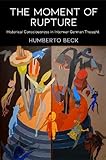The Moment of Rupture : Historical Consciousness in Interwar German Thought / Humberto Beck.
Material type: TextSeries: Intellectual History of the Modern AgePublisher: Philadelphia : University of Pennsylvania Press, [2019]Copyright date: ©2019Description: 1 online resource (232 p.)Content type:
TextSeries: Intellectual History of the Modern AgePublisher: Philadelphia : University of Pennsylvania Press, [2019]Copyright date: ©2019Description: 1 online resource (232 p.)Content type: - 9780812296440
- 901 23
- DD97 .B43 2019eb
- online - DeGruyter
| Item type | Current library | Call number | URL | Status | Notes | Barcode | |
|---|---|---|---|---|---|---|---|
 eBook
eBook
|
Biblioteca "Angelicum" Pont. Univ. S.Tommaso d'Aquino Nuvola online | online - DeGruyter (Browse shelf(Opens below)) | Online access | Not for loan (Accesso limitato) | Accesso per gli utenti autorizzati / Access for authorized users | (dgr)9780812296440 |
Browsing Biblioteca "Angelicum" Pont. Univ. S.Tommaso d'Aquino shelves, Shelving location: Nuvola online Close shelf browser (Hides shelf browser)

|

|

|

|

|

|

|
||
| online - DeGruyter Egyptian Hieroglyphs in the Late Antique Imagination / | online - DeGruyter Speaking with the Dead in Early America / | online - DeGruyter Subjects of Advice : Drama and Counsel from More to Shakespeare / | online - DeGruyter The Moment of Rupture : Historical Consciousness in Interwar German Thought / | online - DeGruyter After Nationalism : Being American in an Age of Division / | online - DeGruyter The Politics of Roman Memory : From the Fall of the Western Empire to the Age of Justinian / | online - DeGruyter That Most Precious Merchandise : The Mediterranean Trade in Black Sea Slaves, 1260-1500 / |
Frontmatter -- Contents -- Introduction -- Chapter 1. The Instant from Goethe to Nietzsche: The Modern Beginnings of a Concept -- Chapter 2. The Instant of the Avant-Garde -- Chapter 3. Ernst Jünger and the Instant of Crisis -- Chapter 4. Ernst Bloch and the Temporality of the Not-Yet -- Chapter 5. Walter Benjamin and the Now-Time of History -- Conclusion. Instantaneism as a Regime of Historicity -- Notes -- Index -- Acknowledgments
restricted access online access with authorization star
http://purl.org/coar/access_right/c_16ec
An instant is the shortest span in which time can be divided and experienced. In an instant, there is no duration: it is an interruption that happens in the blink of an eye. For the ancient Greeks, kairos, the time in which exceptional, unrepeatable events occurred, was opposed to chronos, measurable, quantitative, and uniform time. In The Moment of Rupture, Humberto Beck argues that during the years of the First World War, the Russian Revolution, and the rise of fascism in Germany, the notion of the instant migrated from philosophy and aesthetics into politics and became a conceptual framework for the interpretation of collective historical experience that, in turn, transformed the subjective perception of time.According to Beck, a significant juncture occurred in Germany between 1914 and 1940, when a modern tradition of reflection on the instant—spanning the poetry of Goethe, the historical self-understanding of the French Revolution, the aesthetics of early Romanticism, the philosophies of Søren Kierkegaard and Friedrich Nietzsche, and the artistic and literary practices of Charles Baudelaire and the avant gardes—interacted with a new experience of historical time based on rupture and abrupt discontinuity. Beck locates in this juncture three German thinkers—Ernst Jünger, Ernst Bloch, and Walter Benjamin—who fused the consciousness of war, crisis, catastrophe, and revolution with the literary and philosophical formulations of the instantaneous and the sudden in order to intellectually represent an era marked by the dissolution between the extraordinary and the everyday. The Moment of Rupture demonstrates how Jünger, Bloch, and Benjamin produced a constellation of figures of sudden temporality that contributed to the formation of what Beck calls a distinct "regime of historicity," a mode of experiencing time based on the notion of a discontinuous present.
Mode of access: Internet via World Wide Web.
In English.
Description based on online resource; title from PDF title page (publisher's Web site, viewed 26. Mai 2021)


